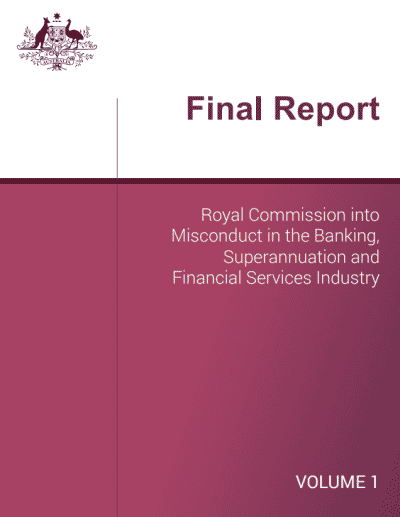Royal Commission
The Royal Commission into banking, superannuation, and the financial services industry came out at 4.10pm today No doubt within our bubble of financial services all my conversations with peers will be around this, and the increasing education requirements (FASEA).
I wanted to touch base as I think you will hear a bit about this and wonder how it will impact you. The report is 510 pages long so it will take a while to get through and report back to you on what is happening. Click here to download the entire report.
It is a very comprehensive review of the whole financial system so the implications are far beyond just financial advice, and the recommendations could impact you through insurances and lending also.
Commissioner Kenneth Hayne has made 76 recommendations and in the preface to his final report he made four overarching observations. Here are the key takeouts in his words:
“In almost every case, the conduct in issue was driven not only by the relevant entity’s pursuit of profit but also by individuals’ pursuit of gain, whether in the form of remuneration for the individual or profit for the individual’s business. Providing service to customers was relegated to second place. Sales became all important.”
“Rewarding misconduct is wrong. Yet incentive, bonus, and commission schemes throughout the financial services industry have measured sales and profit, but not compliance with the law and proper standards. Incentives have been offered, and rewards have been paid, regardless of whether the sale was made, or profit derived, in accordance with law. Rewards have been paid regardless of whether the person rewarded should have done what they did.”
“Consumers often dealt with a financial services entity through an intermediary. The client might assume that the person standing between the client and the entity that would provide a financial service or product acted for the client and in the client’s interests. But, in many cases, the intermediary is paid by and may act in the interests of, the provider of the service or product. Or, if the intermediary does not act for the provider, the intermediary may act only in the interests of the intermediary.”
“Too often, financial services entities that broke the law were not properly held to account. Misconduct will be deterred only if entities believe that misconduct will be detected, denounced and justly punished. Misconduct, especially misconduct that yields profit, is not deterred by requiring those who are found to have done wrong to do no more than pay compensation. And wrongdoing is not denounced by issuing a media release. The Australian community expects and is entitled to expect, that if an entity breaks the law and causes damage to customers, it will compensate those affected customers. But the community also expects that financial services entities that break the law will be held to account. The community recognises, and the community expects its regulators to recognise, that these are two different steps: having a wrongdoer compensate those harmed is one thing; holding wrongdoers to account is another.”
We will see what gets implemented and what does not. It will be an interesting next few months with an upcoming election in May. If you have any questions please feel Complimentary to contact us.































































